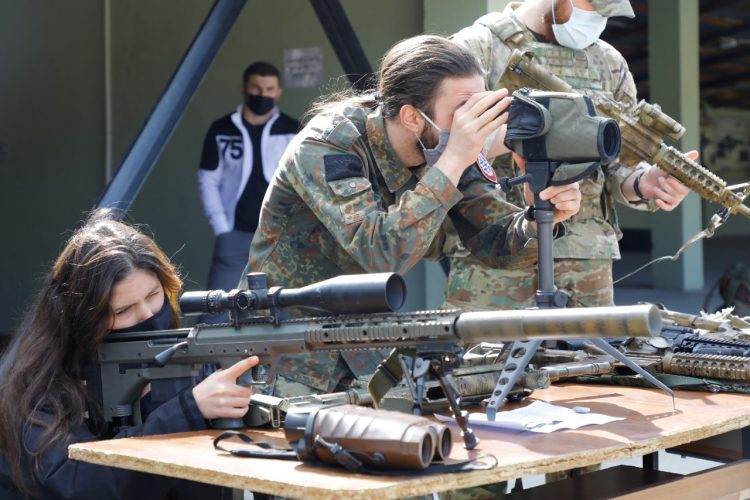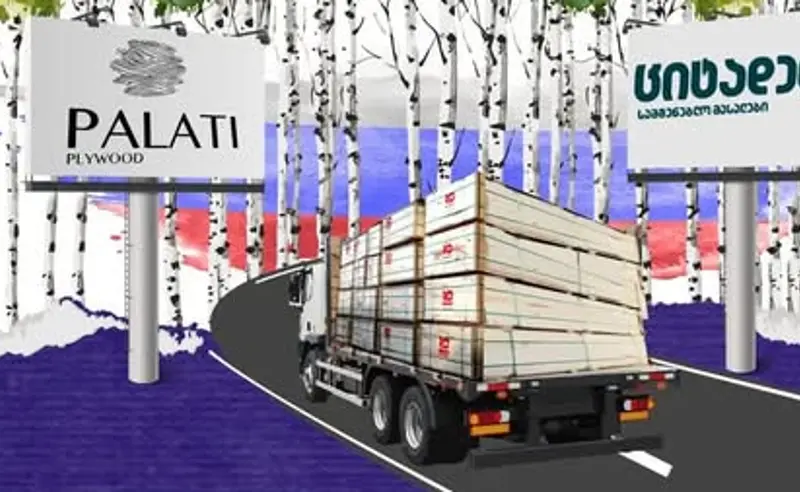
How Russian Birch Plywood Enters Europe Under a Georgian Label
19/09/2025 18:56:00 Analysis
Authors: Aidan Yusifi, Mariam Kachkachashvili, and Nanuka Bregadze
“For the first time in Georgia, we produce top-quality birch plywood of all grades and thicknesses,” reads a post on Palati’s Facebook page.
“Where is Birch in Georgia? You’re not producing it, you’re importing it from Russia,” one citizen replied in the comments.
“Of course, birch doesn’t grow in Georgia. We import it from Ukraine, Europe, Kazakhstan, and other countries,” Palati defended itself.
But among these “other countries,” Palati included Russia — in fact, its leading supplier.
The reality is that Palati’s entire operation rests on Russian raw materials: birch sheets are hauled in from factories in Moscow, St. Petersburg, and Nizhny Novgorod, rebranded as “Georgian” plywood, and then shipped off to Europe. In other words, the company is helping Russia sell a product that is subject to sanctions.
Georgia has already helped ease Russia’s sanctions burden before. iFact has published five investigations on the topic. This time, we worked together with the Czech investigative outlet Investigace.
For four months, we investigated who imports Russian birch wood into Georgia, who transforms it into “Georgian” products, how the first plywood factory was established in Rustavi, and how, for the first time in history, Georgia became a major exporter of birch plywood to Europe. All of this coincided with Russia’s full-scale war in Ukraine.
Between 2023 and 2025, birch plywood worth $29 million was exported from Georgia to Europe — the records list: Origin country – Georgia.
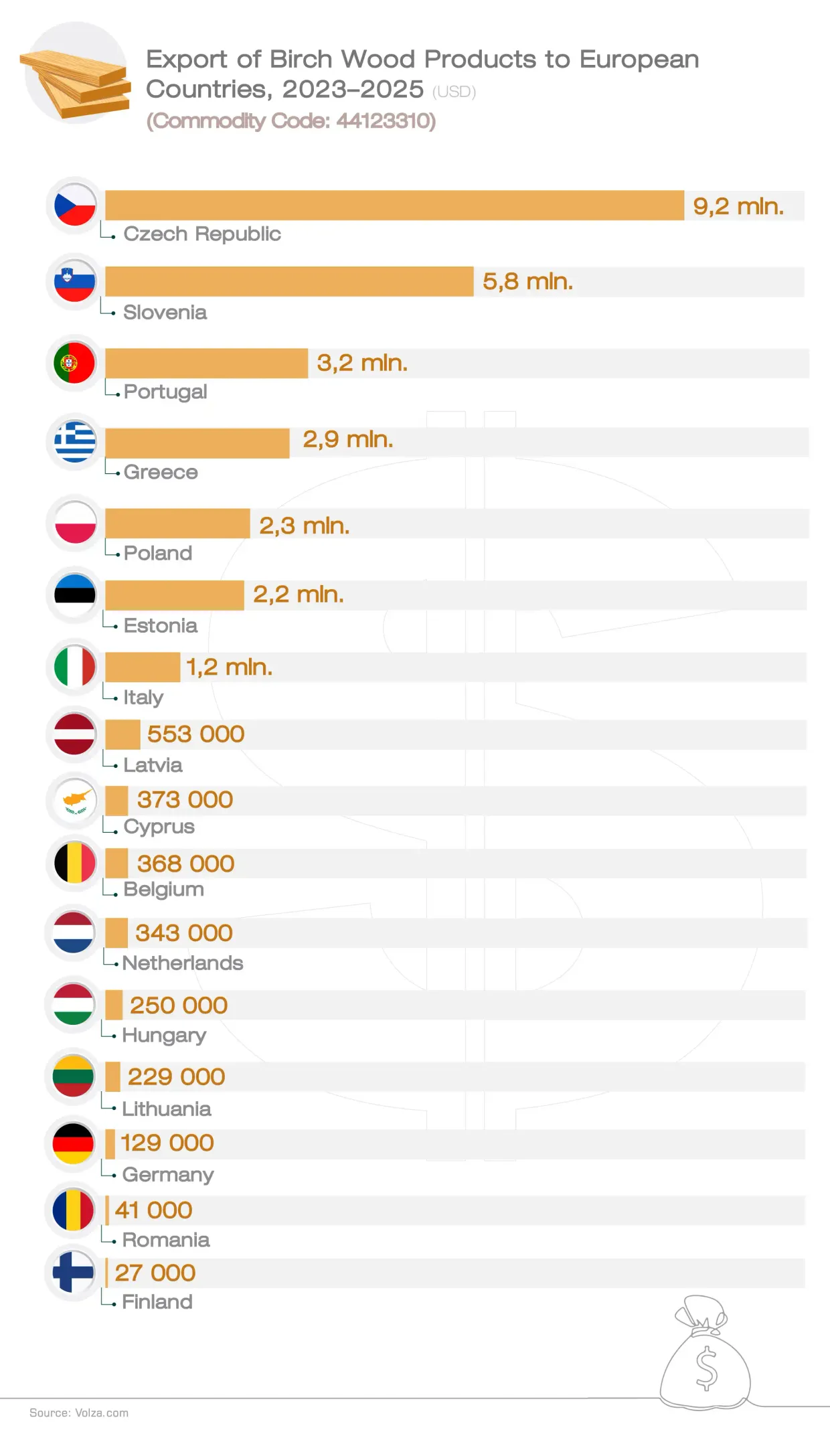
It should be obvious that this claim is absurd: birch suitable for plywood production simply does not grow in Georgia.
“This birch here has twisted trunks and is very poor in quality. In other words, it is physically impossible to obtain timber for materials from it. The Russian beryozas that were imported during Soviet times are completely different from our local species. In the forests of Siberia, birch trees grow into huge, perfectly straight specimens — like pencils — covering millions of hectares. That made harvesting and processing it commercially profitable, both for materials and for furniture,” explained Ilia Akobia, a forestry specialist who studies the birch groves of the Caucasus.
The conclusion is clear: in Georgia, we don’t even have enough birch for our own consumption, let alone for export. The plywood shipped to Europe is produced using Russian raw material. Between 2021 and 2025, Georgia imported $45 million worth of birch wood from Russia, while imports from other countries totaled approximately$200,000.
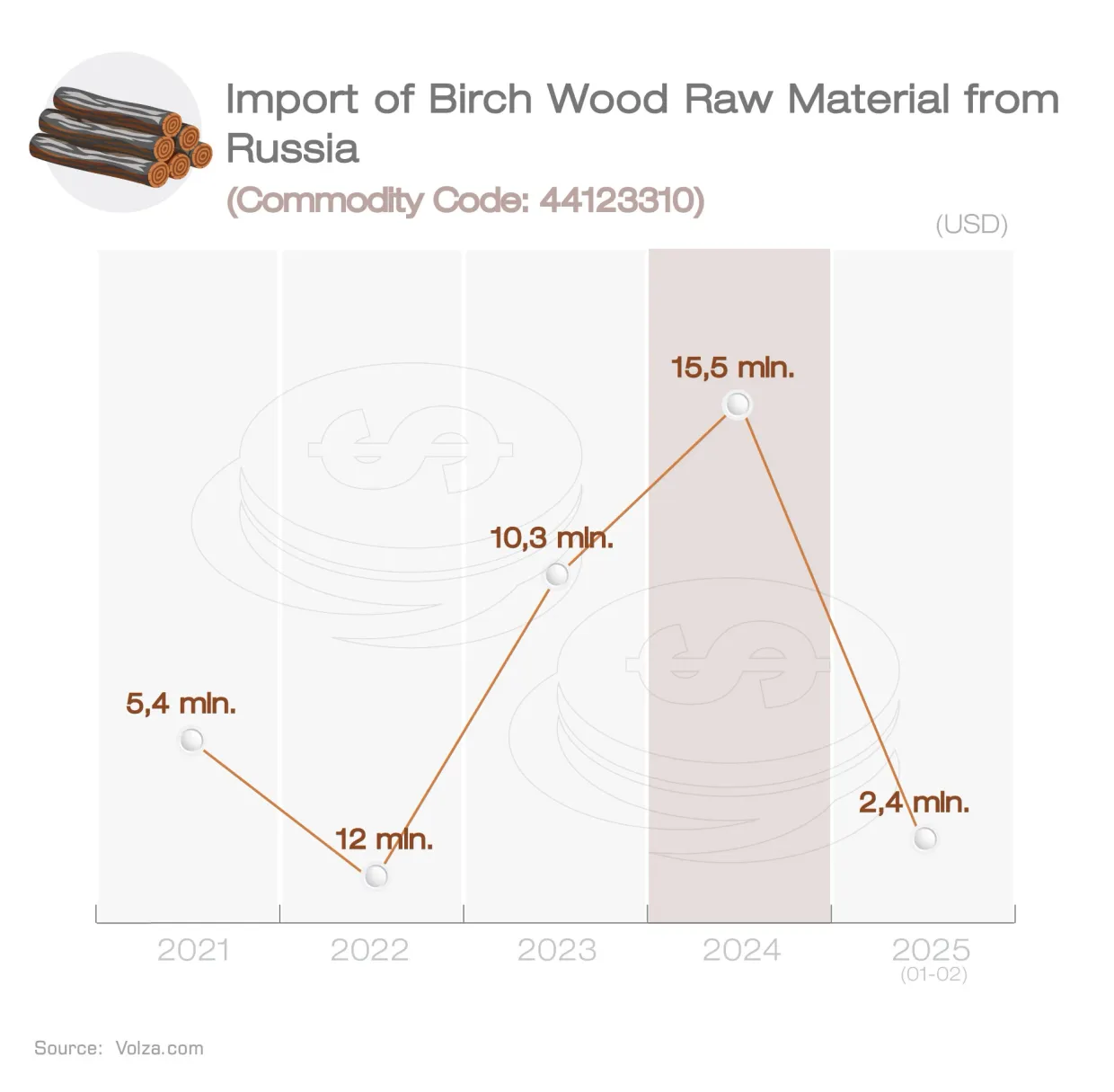
Why are these figures damaging to our country’s reputation?
Here’s what you need to know:
· In 2021, the European Commission imposed an anti-dumping regime on Russian birch wood imports into Europe, accompanied by a special tariff. The reason was that Russian plywood was entering Europe at a significantly lower price, harming local producers.
· In April 2022, the EU banned not only birch but all Russian wood imports, citing Russia’s aggression against Ukraine.
· In this situation, Russia was aided by Kazakhstan and Turkey, which launched unprecedented exports of Russian birch plywood to Europe. Between 2022 and 2025, they exported €210 million worth of birch plywood to the EU — despite not having traded this product with Europe before.
· The European Commission uncovered this scheme and, from May 2024, extended the anti-dumping regime to birch plywood imported from Turkey and Kazakhstan. As a result, their exports of the product to Europe dropped in 2024.
· Georgia then stepped in to take their place, exporting an unprecedented volume of birch plywood to Europe in 2024.
· In March 2025, the European Commission labeled Russian birch wood a particularly high-risk product: “Plywood, especially birch plywood, is one of the main sources of revenue for Russia and Belarus […] To sell their plywood in the EU, Russian and Belarusian producers use companies in third countries that repackage and relabel the product.”
· By June 2025, Georgia had even overtaken China in exports of birch plywood to Europe.
· Between 2021 and 2024, imports of birch and other wood from Russia into Georgia reached a historic high.
· Georgian companies import Russian birch as raw material, process it locally, and turn it into plywood, which they then export to Europe as if it were a Georgian product. The routes are: Georgia–Turkey–Europe, or, more boldly, direct shipments to Europe.
· We identified the Georgian companies importing Russian birch wood. The largest among them is Citadel, which sources materials from factories owned by sanctioned Russian billionaires and members of Putin’s party.
· We identified a company connected to Citadel— Palati-2022, the only exporter of Russian birch plywood from Georgia to Europe. Behind both Citadel and Palati stand the same people: Tariel Tsutsqiridze and brothers Giorgi and Irakli Shekiladze.
· Georgian companies import Russian birch as raw material, process it locally, and turn it into plywood, which they then export to Europe as if it were a Georgian product. The routes are: Georgia–Turkey–Europe, or, more boldly, direct shipments to Europe.
How We Investigated
At the end of 2024, a foreign colleague told us: “I’ve heard from an anonymous source that a Russian plywood manufacturer has opened a factory in Georgia, producing birch-based products here and then exporting them to Europe. The company involved is LLC Palati 2022.” That was when we began digging into the details.
For this investigation, we analyzed foreign trade data for products that Russia is restricted from exporting to EU countries:
· 44 – Wood and wood products
Materials under code 44 include:
o 441233– Plywood consisting of sheets of wood, glued together
o 44123310– With at least one outer ply of birch
o 440890– Veneer sheets for plywood, excluding coniferous and tropical species
To trace the birch wood trade, we worked with seven statistical databases:
· ex-trade.geostat.ge– Georgia’s National Statistics Office portal, which provides only foreign trade data.
· comtradeplus.un.org– UN trade portal, compiling statistics from customs offices around the world.
· ec.europa.eu– Eurostat, which collects EU member states’ trade and demographic data from their national statistics offices.
· volza.com– A U.S.-based (Delaware) international database that aggregates trade data from official sources and customs declarations.
· importgenius.com– A U.S.-based (Arizona) foreign trade portal that compiles data from Europe, Asia, North and Latin America, relying solely on customs documents.
· exportgenius.in– An India-based platform collecting export–import data from over 60 countries, based on customs declarations and official trade records.
· Web.eximedia.app– Another India-based platform that includes export–import information from the customs offices of more than 100 countries.


Russian Birch Marketed as Georgian Plywood
Palati’s Plywood in the Czech Republic, via Turkey
Two weeks ago, in the Czech town of Osík, we found packaged birch plywood at the warehouse of the company Orlimex. Our partner journalist, Kristýna Wejnbender, inspected the boxes on site and noticed the labels attached to them.
The packaging showed that the material was produced by the Georgian company Palati Plywood. This company manufactures plywood in Rustavi and sells it in Europe and the United States. To make it, however, it imports birch raw material primarily from Russia. In effect, with Palati’s help, Russia has managed to circumvent restrictions: birch wood still reached the market, and products made from it still entered Europe.
Palati was registered in Georgia in 2022. Just a month after its founding, it began importing wood materials from Russia. Since then, it has brought in birch sheets — thin veneer layers — worth $14 million from nine Russian companies.
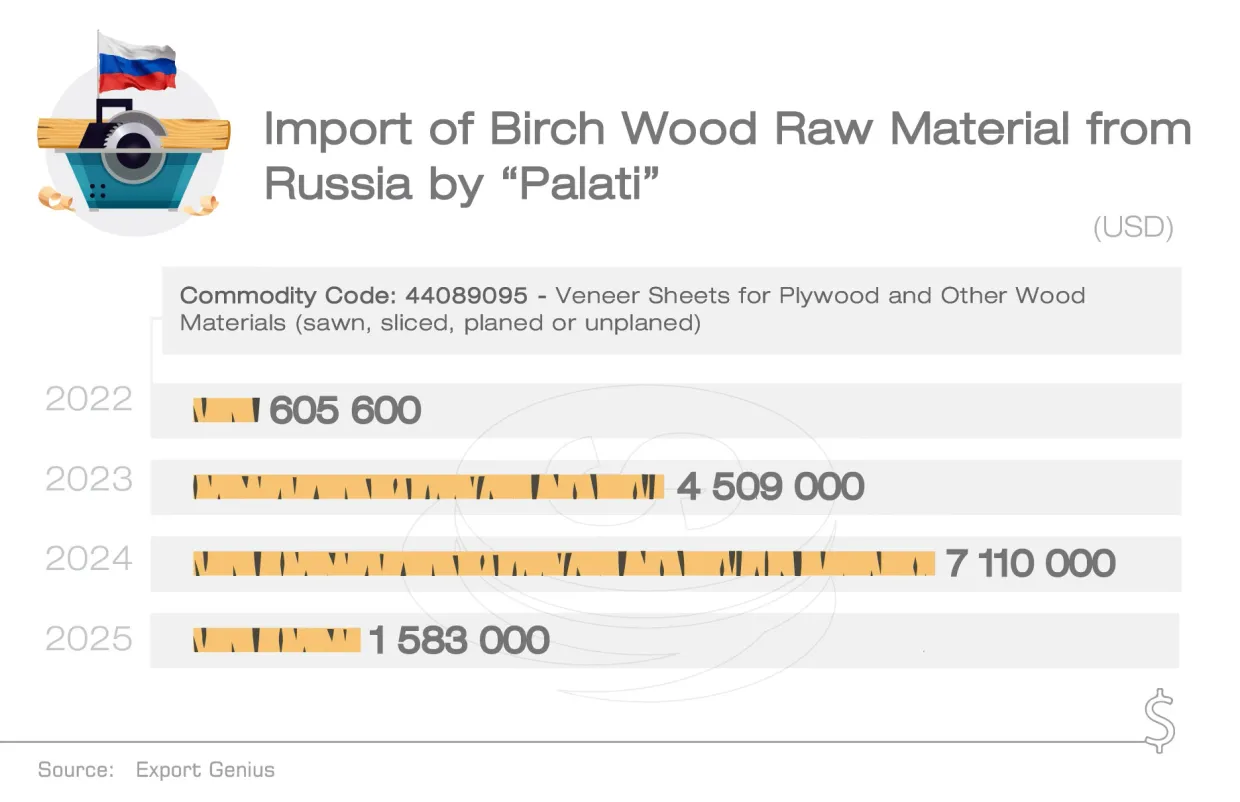
Palati sources birch wood from the following Russian companies: Нижегородский Лесокомбинат (НЛК), Красный Октябрь, Фанпром, М-Вуд Плайвуд, Старвуд НН, Фандера, Альтернатива, and Эволоджик. Their main business areas are laminated plywood, thin wood veneers, and pressed wood fuel.
The most notable of these is Фандера. Behind this Russian company stand members of Russia’s ruling party, United Russia. Its director, Sergey Kharitonov, and 50% shareholder, Sergey Boryakin, are deputies of the Nizhny Novgorod regional legislature. Фандера, Фанпром, and НЛК supply their plywood to Старвуд НН, which serves as their official distributor.
One might assume that the Russian birch plywood imported by Palati is needed domestically, for durable furniture or construction materials. In reality, Palati’s products don’t stay in Georgia at all — they are entirely exported, thereby strengthening the Russian economy.
In 2024, the company itself declared: “100% of our products are exported — 70% to Europe and 30% to the U.S.” At the same time, it boasted: “We produce Georgian products and strengthen Georgia.”
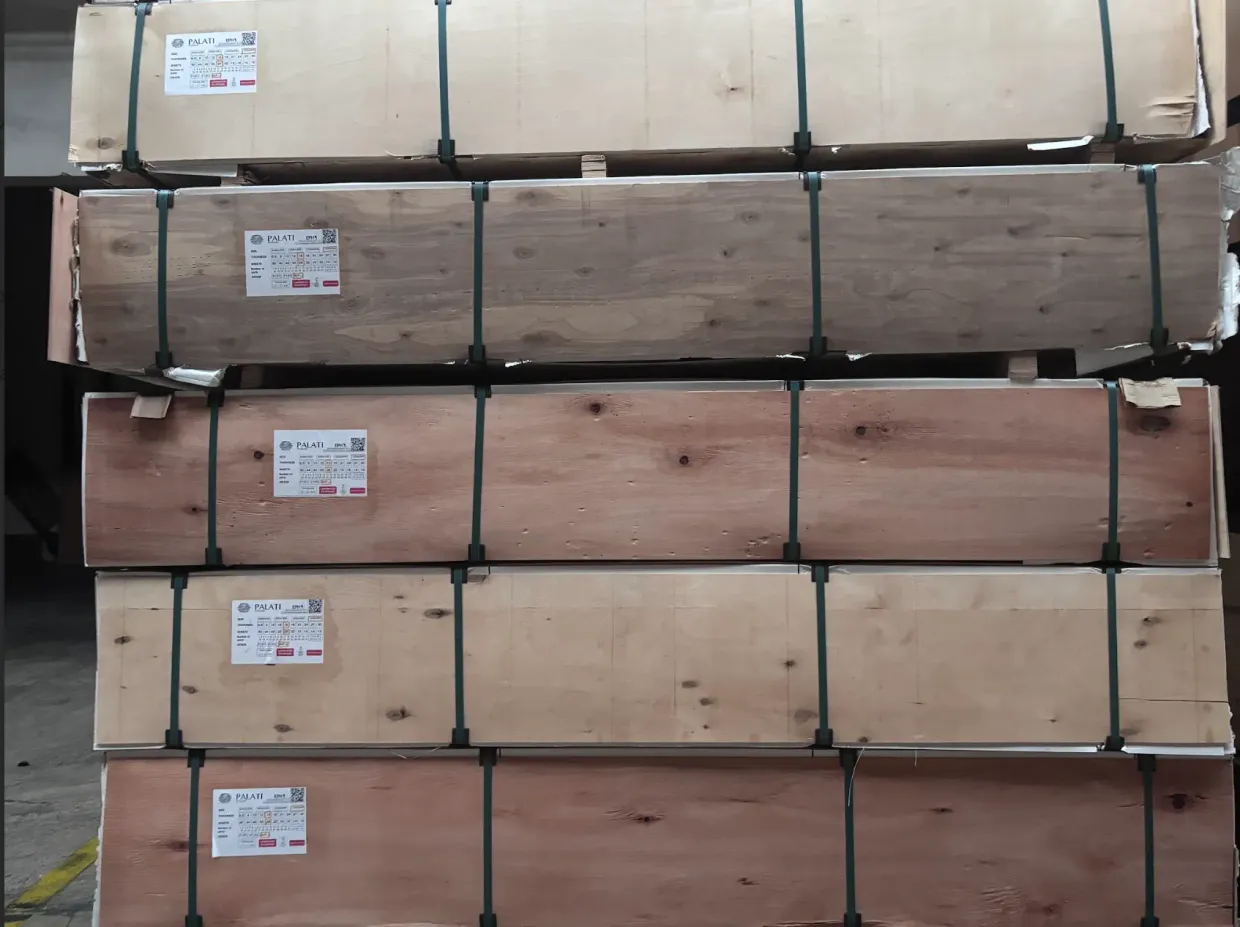
Here’s how Palati’s boxes ended up in the Czech warehouse: in October 2024, Palati delivered 13 shipments of birch plywood to Orlimex, routed through Turkey. Data from the international trade database Volza confirm this.
The trade between “Palati” and the Czech Republic is also confirmed by a document obtained by our partner “Investigace.” According to the accounting sheet, “Orlimex” received more than 10,000 cubic meters of material from Georgia between 2023 and 2025. Notably, “Orlimex” began trading with Georgia in the very same year it cut ties with Russia.
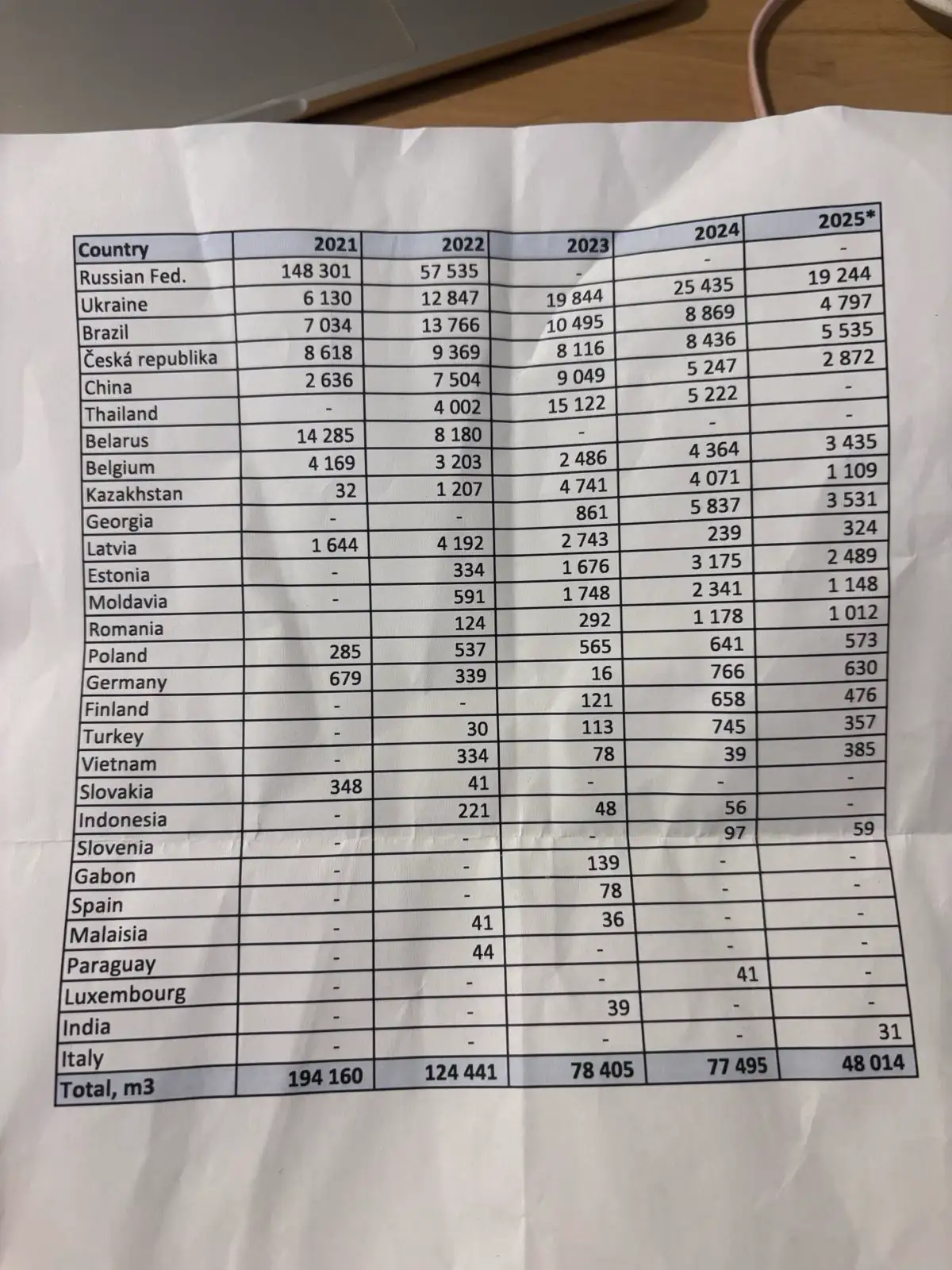
Our colleague Kristýna Wejnbender also spoke with Sergey Pavlovets, co-founder of Orlimex. According to Pavlovets, he has even visited Palati’s factory in Georgia and believes the products his company buys are made only from Latvian birch:
“They relocated to Georgia right after the war began, before sanctions on plywood were imposed […] Russians run the factory, it’s a Russian operation with Russian equipment. However, we are convinced that the products we purchase are not made from Russian raw material.”
But statistics and our investigation show that Orlimex has been misled.
In its financial reports, Palati lists Estonia, Latvia, Brazil, and Russia as sources of raw material. To verify this, we checked the company’s trade data in two international databases, Export Genius and Volza. Both showed imports coming exclusively from Russia.
Imports of this product from Estonia, Latvia, and Brazil into Georgia are negligible nationwide, making it impossible for them to be Palati’s primary source of raw material.
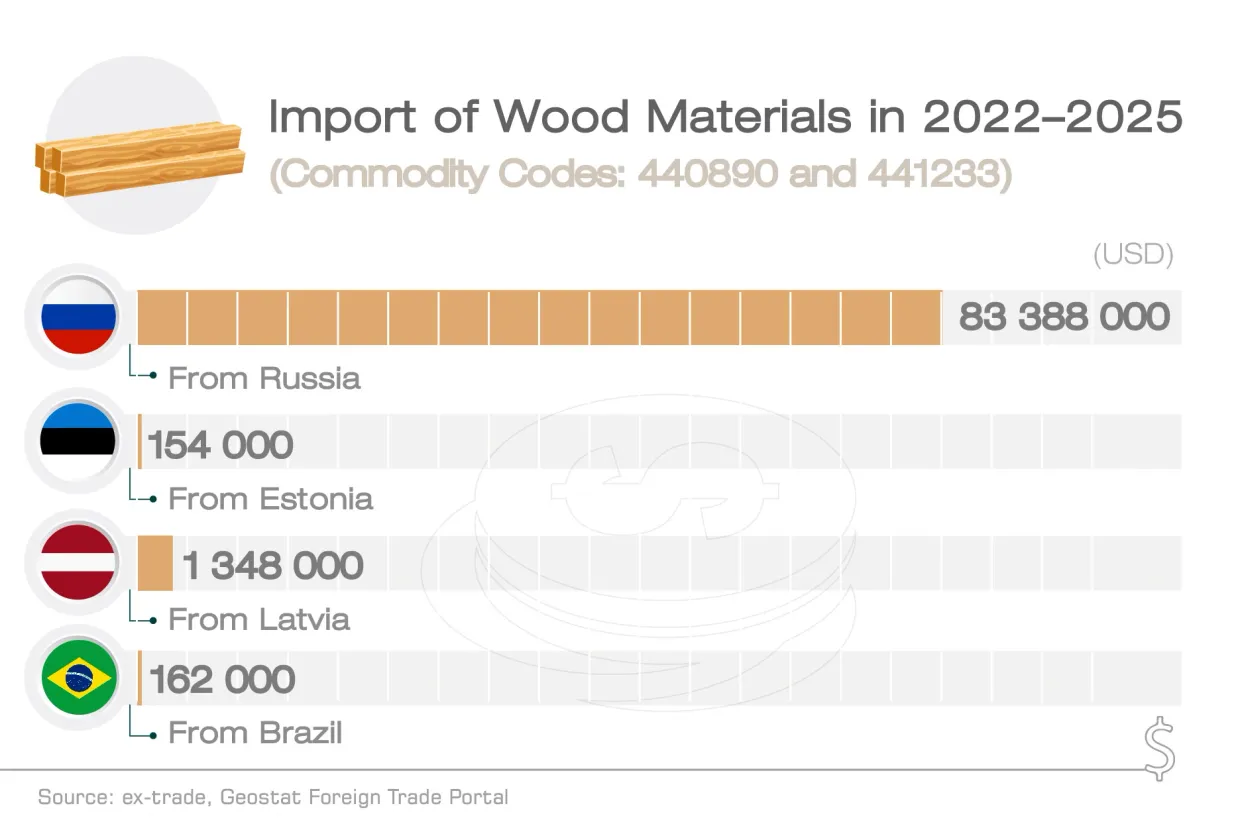
“Georgia’s case is particularly suspicious: Palati, the main plywood producer, was founded after the Russian invasion. Its exports to the EU have risen sharply. Yet Georgia has no tradition of producing birch plywood […] So far, customs inspections have not detected any problems. In our view, this is due to superficial control,” says Tara Ganesh, Head of Earthsight’s Forests and Sanctions Program.
Palati’s Plywood in Greece, via Turkey
The Czech Republic is not the only European country where Palati trades successfully. Its birch plywood has also reached Greece. Here’s how:
In 2023–2024, Palati sold birch plywood worth $132,000 (147 cubic meters) to the Turkish joint-stock company Umut Sarf Orman Ürünleri. Umut then shipped this very same material from Istanbul to Greece.
Umut does not deny its dealings with Palati. During an experiment conducted as part of our journalistic investigation, Mehmet Ali, the company’s director and founder, openly confirmed the trade. He explained that he buys materials exclusively from the Georgian company, adds a 4% margin, and then resells them to European countries — Greece, Italy, Portugal, and Spain.
“We already sell their products in Europe […] and anti-dumping laws do not apply to us, since we are only resellers. The products are manufactured in Georgia, they carry a certificate of origin and a Euro1 certificate [used between countries with free trade agreements; Georgia has had free trade with Europe since 2014]. As a result, no duties apply to this product. We have an exclusive contract with Palati: they sell only through us and do not serve clients directly, because every month we buy enough containers,” Mehmet Ali said.
According to Ali, Palati is essentially a Russian enterprise. Two other independent sources confirmed this in interviews with us:
“This is basically a Russian company. They set up their factory right after the war began, and now they sell goods from Georgia,” Mehmet Ali said.
“I believe Russia’s STARWOOD opened an additional production line in Georgia under the name of Palati’s factory. The plywood produced there first goes to Turkey, is cleared through customs, and then moves on to Europe,” said Ekaterine, a representative of the Russian wood manufacturer Murashinsky Plywood.
“The factory has Georgian owners, but its sales management team and engineers really do come from Russia,” says Sergey Pavlovets, co-founder of the Czech company Orlimex. When asked where Palati’s Russian managers had previously worked, Pavlovets replied: “They were part of the STARWOOD group of companies.”
Starwood is the official distributor of forestry enterprises based in Nizhny Novgorod. The company offers customers a wide range of birch plywood supplied by these manufacturers.
iFact has yet another piece of evidence that Palati was determined to penetrate the European market despite the risks. On April 13, 2023, Palati’s commercial director, Tamar Demurishvili, emailed a Greek company offering to sell plywood and even sent a promotional video.
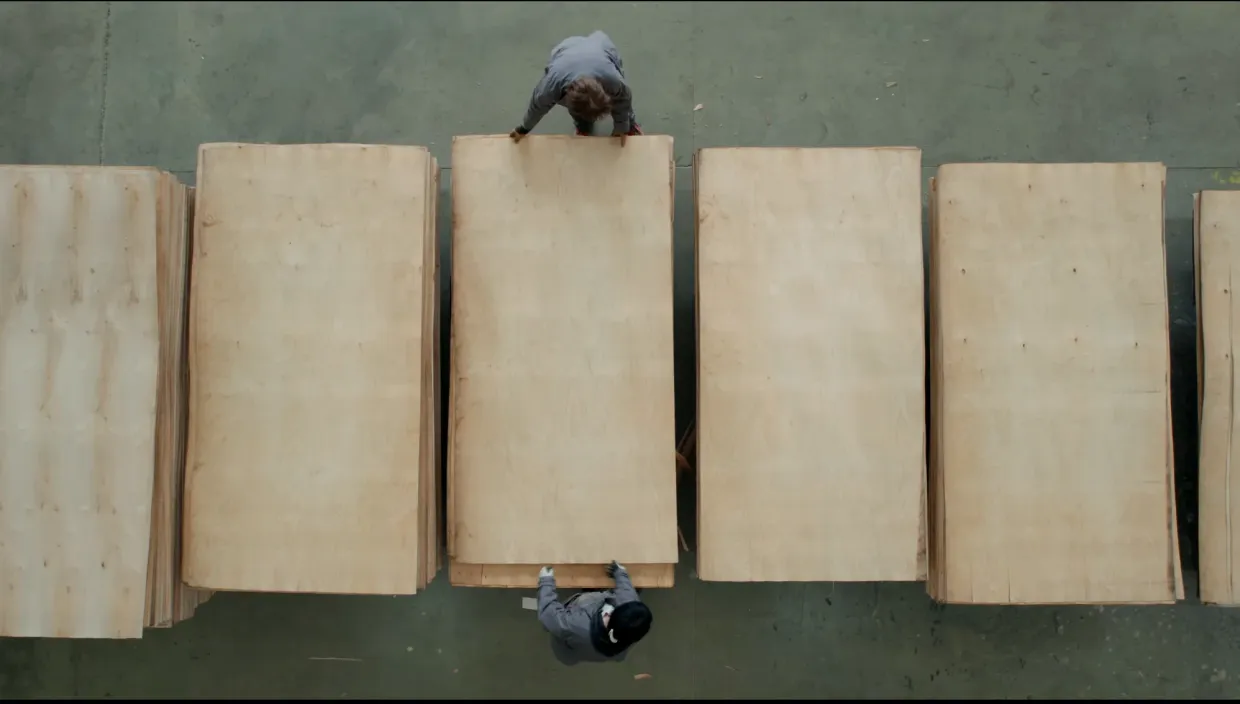
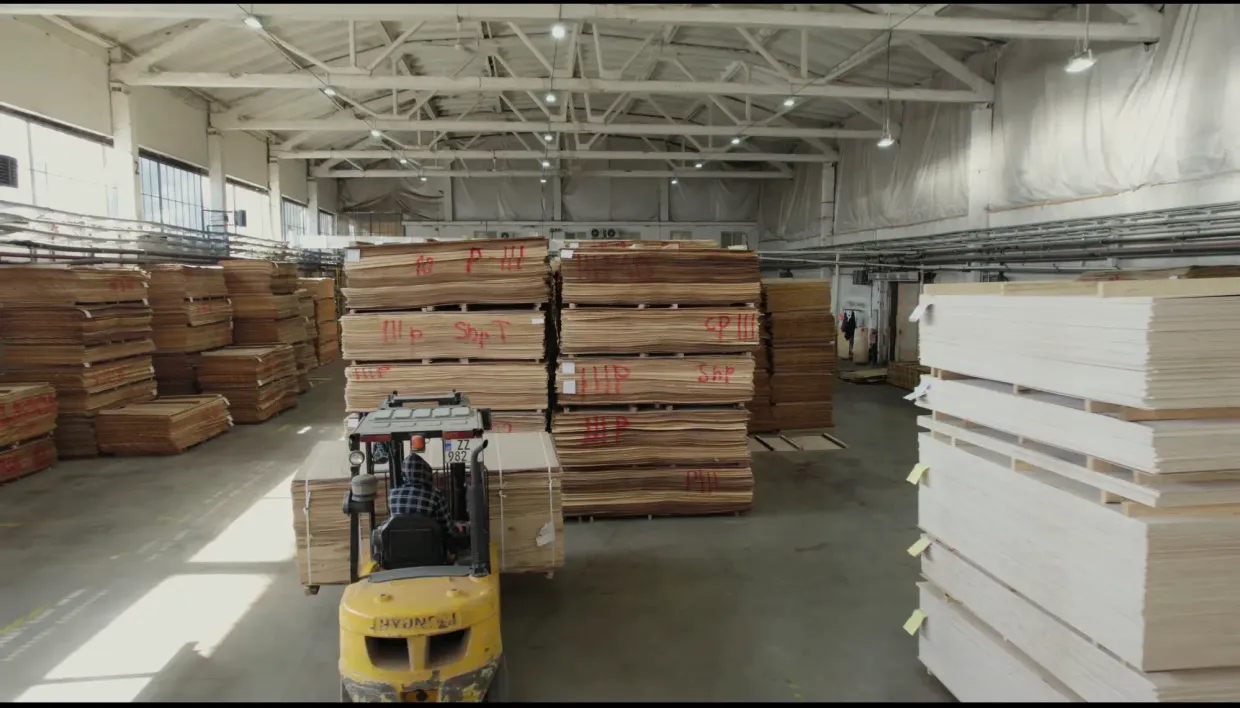
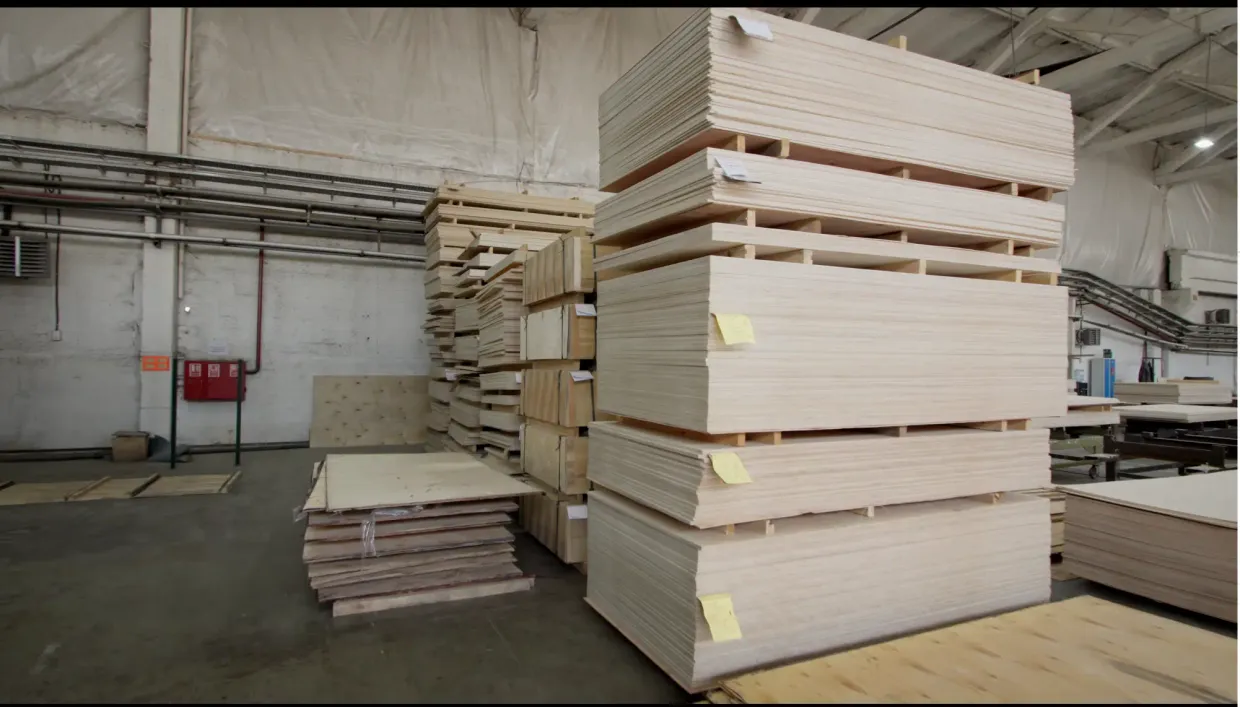
Palati’s Plywood Shipped Directly to Europe
iFact has determined that Palati is the only Georgian company selling Russian birch plywood under a Georgian label. In other words, the entire $29 million worth of birch plywood exported from Georgia to Europe over the past three years came solely from Palati.
We uncovered this by cross-checking international and local statistical data. Step by step, here’s how the scheme works:
· The Volza database shows that between 2023 and 2025, birch wood worth a total of $29 million was exported from Georgia to Europe. In all cases, the listed origin country is Georgia.
· Georgian origin is indicated only when the product is manufactured or processed within the country; and only Palati can do this, since it operates a factory.
· Geostat records confirm that in 2023–2025, only two Georgian companies exported wood materials to Europe: Palati-2022and T-T-C. Of these, only Palati owns a plywood factory. This means it is the only company able to import Russian raw materials, process them locally, and export them to Europe under a Georgian origin label.
Palati shipped birch plywood to 16 European countries — most notably the Czech Republic, Slovenia, Portugal, Greece, and Poland.
It appears that European companies failed to realize that Palati was sourcing its raw material from Russia—the reason: Russian origin is never indicated in Palati’s trade documentation. The company itself admitted as much during an experiment conducted as part of our journalistic investigation.
Here’s how the experiment unfolded:
An Earthsight researcher visited Palati’s Rustavi factory, introduced himself as a potential client, and asked the company’s administrative director and sales manager to sell him Russian-standard birch wood and export it to Europe — but in such a way that the real origin of the raw material would not appear in the documents.
· Palati:“We only have birch from Russia, Estonia, and Latvia.”
· Earthsight:“And what should we do? We can’t have it written in the documents that it’s Russian.”
· Palati:“We don’t mention it at all — it won’t appear. If you ask for a UTR [the EU regulation that bans imports of illegally harvested wood], then it will be indicated as coming from Russia […] However, that isn’t necessary; no client in Europe ever requests this. That’s why I’m telling you, you don’t need it at all. […] If you feel it’s risky, we can arrange it so that your order will be made only from Estonian wood. Though I’m not completely sure…” (one employee hesitates and glances at the other).
· Earthsight:“I mean only on paper!”
· Palati:“On paper! Understood.” (the second employee nods in agreement).
We reached out to Palati for an interview on September 8. Administrative manager Natia Gvadzabia asked about our identity, noted down that we were from iFact, and told us:
“Tomorrow I’ll let you know who will speak with you.”The next day, however, she relayed the company’s refusal: “Management told me to say that we will not comment on this issue.”
We also contacted Palati’s European partner companies to ask whether they are aware that they are purchasing plywood made from Russian birch — and thereby indirectly participating in a sanctions-evasion scheme. So far, none of them has responded.
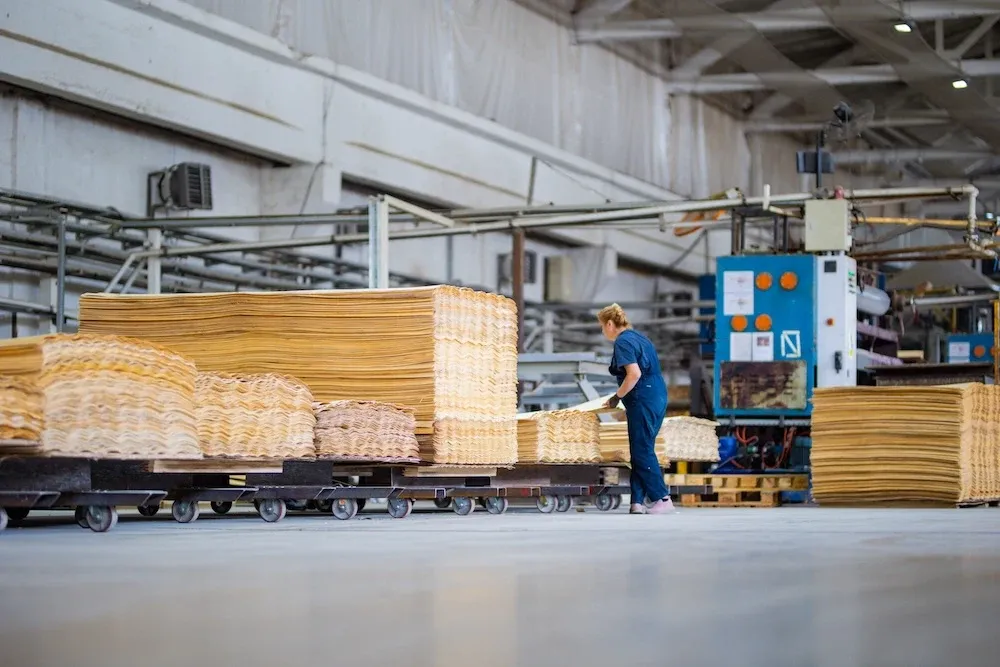
Since September 2023, Palati has been recognized as an “authorized exporter” of plywood. This means the company has obtained approval from Georgia’s Revenue Service to label its products as “Made in Georgia” and export them under preferential conditions.
The status of authorized exporter is granted to a company that has been engaged in economic activity for at least one year, has no record of legal violations in the past year, no outstanding tax debts, and has exported goods of preferential origin (Georgian) worth at least 100,000 GEL during that period.
In practice, this status allows Palati to fill out its own certificate of origin without submitting an EUR.1 certificate [the official Revenue Service document verifying the origin of goods]. Instead, the company lists its “authorized exporter” code on the invoice — and that alone convinces customs officials that the product is genuinely Georgian.
We asked the Revenue Service of Georgia how they monitor Palati’s production, whether they are aware that the company uses Russian raw material, and — if they learned this from us — what measures they plan to take to strengthen control over plywood exports in the future. We requested an in-person interview, but the agency preferred written questions. So far, they have not responded. If they do provide answers, we will update this article accordingly.
“If controls are weak, this status can become a loophole for circumventing regulations, effectively helping Russia avoid sanctions… The risk is minimal, for example, that someone would import wine and then re-export it under Georgia’s name. That’s why businesses in this field can safely be granted authorized exporter status. But when it comes to wood processing, raw materials are also imported from our northern neighbor. If such a company is granted this status, the risk is high. It could act as a re-exporter, potentially distorting the issue of origin. If this fact is uncovered, it will spark a scandal and damage Georgia’s international reputation,” says economist Ramaz Gerliani.
Palati is also included in the Revenue Service’s “Golden List.” “Participation in the ‘Golden List’ allows us to benefit from simplified customs procedures, which further improves the delivery of our products beyond the country’s borders,” the company wrote on its Facebook page in December 2023. The list includes major importers and exporters that have traded goods worth at least 5 million GEL in a single year.
Palati also appears on the Revenue Service’s “golden list,” which grants companies simplified customs procedures. The list is reserved for major importers/exporters trading goods worth at least 5 million GEL in a single year.
Beyond these privileges, Palati has also benefited from state budget support. In 2022, it received over 200,000 GEL from the Produce in Georgia program, which it used to cover part of a loan.
Citadel — Another Importer of Russian Raw Materials
Palati was not the pioneer in trading Russian birch wood. Before it, this market had already been taken over by Citadel. However, both companies share the same owner.
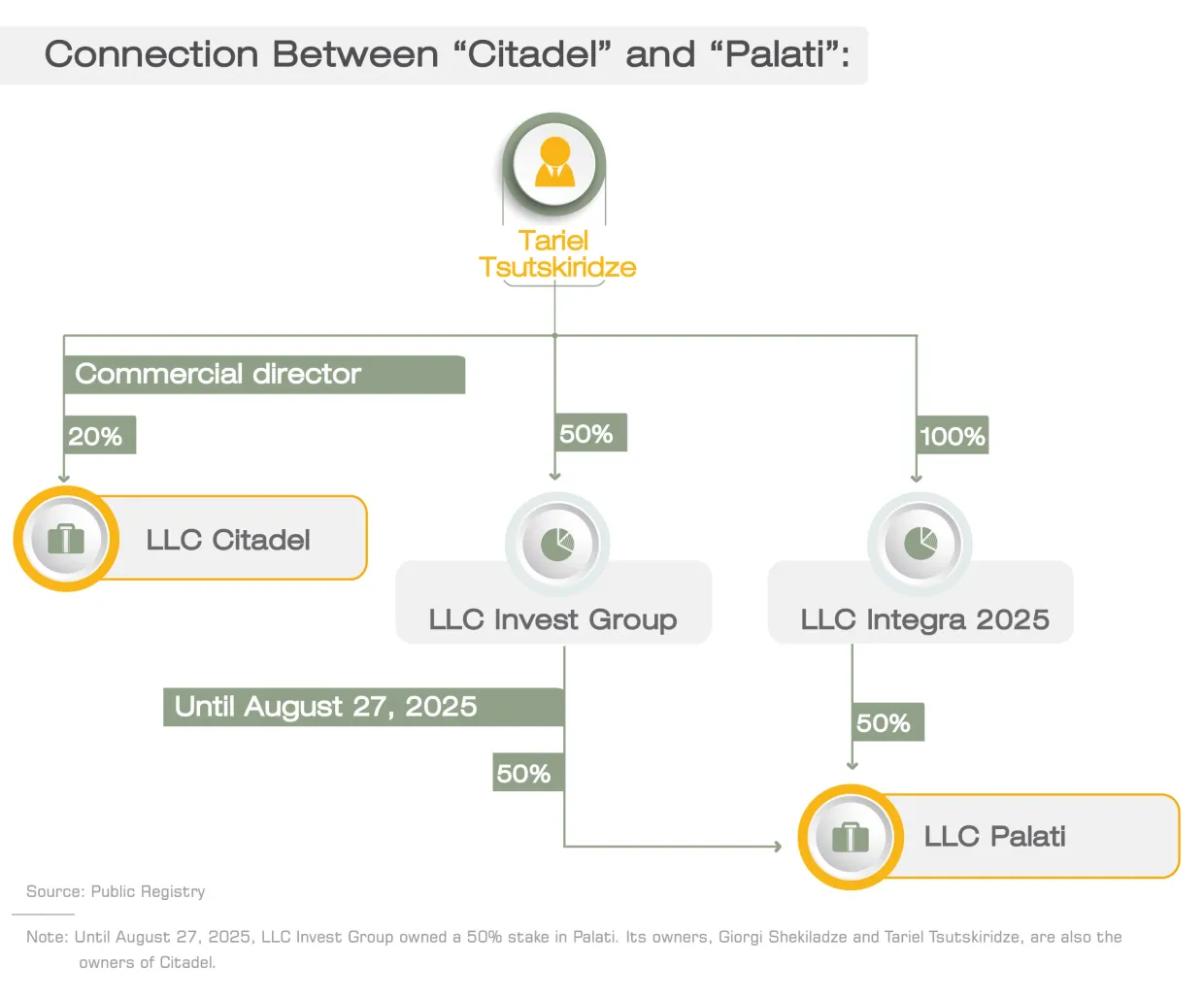
Author’s note: The other 50% of Palati is owned by Indonesian LLC PT Bahan Konstruksi Internasional. We could not determine who stands behind this company, as Indonesian registries are closed to the media.
Citadel was importing millions of dollars’ worth of birch wood from Russia even in 2019–2021. However, once restrictions were imposed on Russia — starting in 2022 — the volume of imports doubled.
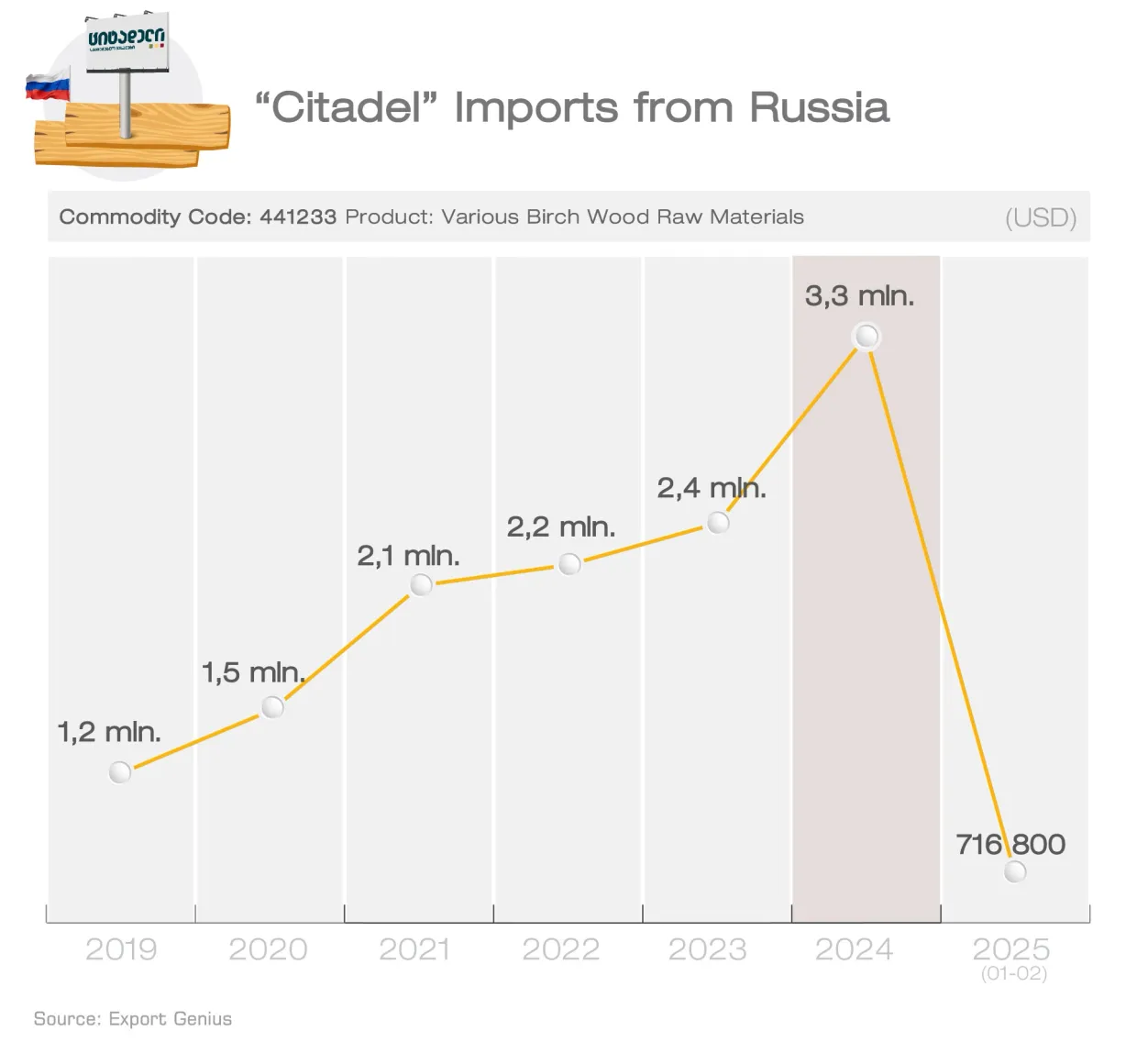
Citadel’s eagerness to expand trade with Russia is evident in its own public filings. In its 2017–2020 financial reports, it listed only one Russian partner. By 2021, that number had grown to 11.
Among Citadel’s partners are companies with close ties to the Russian government. For example, Syktyvkarsky Plywood Plant and Smolensky Dock. Their owners, Mikhail Magi and Vadim Kosykh, are deputies of United Russia, the ruling party.
Citadel has not shied away from doing business with Putin’s inner circle either. Since 2011, it has been the exclusive partner of Russia’s Sveza, from which it imported $3.7 million worth of birch plywood — including $15,000 worth in July 2022, after Sveza became embroiled in a scandal and its owner was sanctioned.
Behind Sveza stands Russian billionaire oligarch Alexey Mordashov, often described in international media as a close ally of the Kremlin. Because he supported the Russian government, billionaire Alexey Mordashov and his companies were sanctioned by the United States, the United Kingdom, and Ukraine. In 2022, Italian police seized his yacht, valued at € 65 million. Mordashov was also the owner of “Bank Rossiya,” widely known as the personal bank of Russia’s political elite.
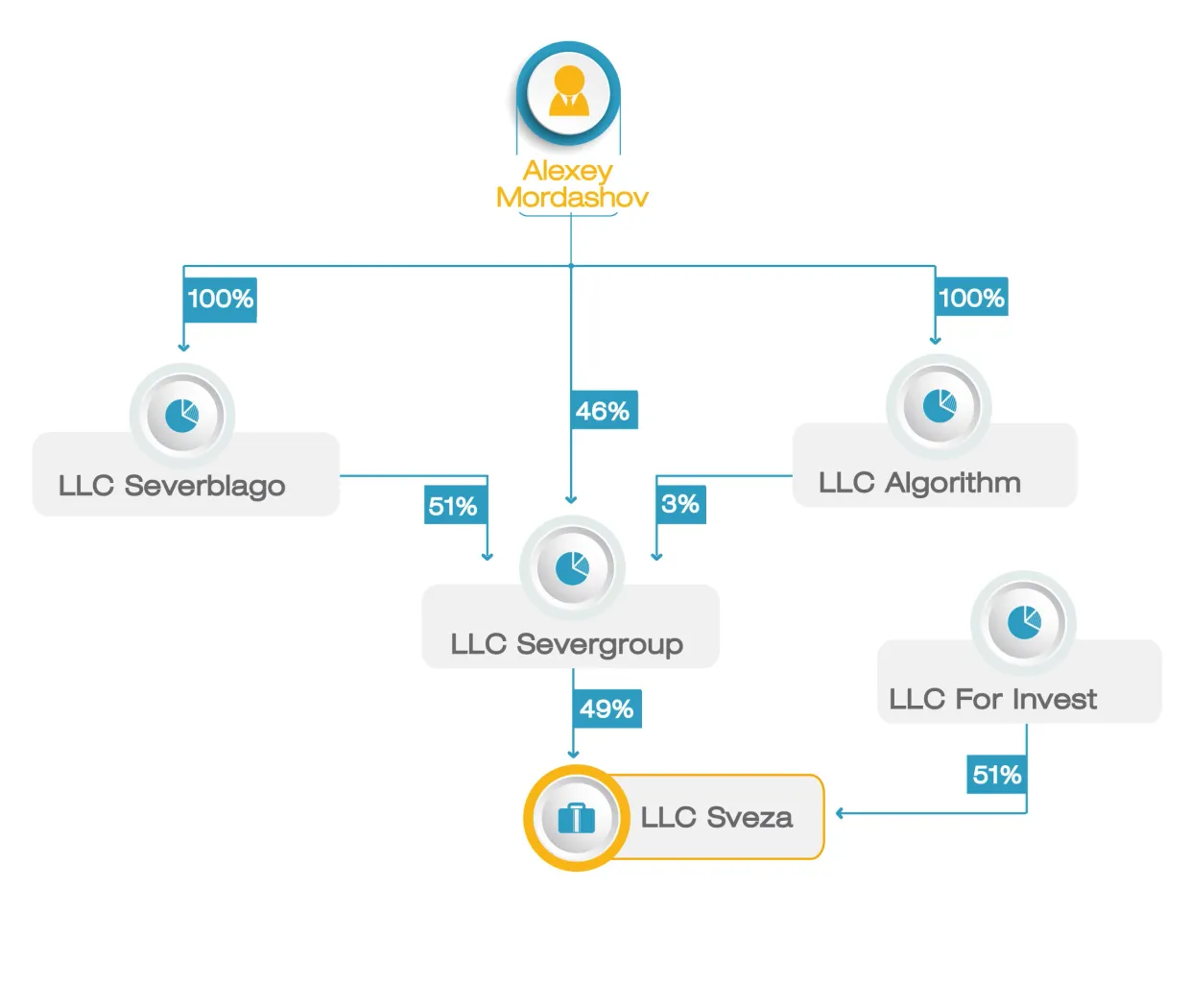
Citadel claims that its imports are not limited to Russia, but also source materials from Austria, Azerbaijan, the UAE, Belarus, China, Greece, Spain, Turkey, Italy, and Germany. But when we checked its trade records in the international databases Volza and Export Genius, the results told a different story: birch wood raw material is imported exclusively from Russia. Imports from Austria and the UAE were minimal, involving other types of wood, while no imports were recorded from the other eight countries.
Citadel is also an active participant in state procurement of Georgia. Since 2012, it has signed contracts worth 2.4 million GEL — half a million of which were obtained through simplified procurement. Most of these contracts involved supplying finished plywood to state institutions. In two cases, the company explicitly stated that the plywood was made from Russian raw material.
In 2017–2018, Citadel supplied 7,681 pieces of plywood made directly from Russian wood to the Ministries of Internal Affairs and Defense. The total contract value was 130,000 GEL.
Trade documents also prove that Citadel does not import Russian birch wood solely for use in Georgia, but also re-exports it abroad. For example, between 2022 and 2025, Citadel shipped birch wood worth $469,000 to Armenia, in 32 separate transactions. Every one of those documents listed the origin country as Russia, even though the cargo was dispatched from Georgia. The recipient was Citadel’s own Armenian subsidiary. The fate of the plywood after it left Georgia remains unclear.
However, based on international databases such as Volza and Export Genius, it can be stated that Georgia and Armenia had no history of trade in birch plywood before 2022. In parallel, starting from 2022, large volumes of birch plywood also began to be exported from Armenia to Europe. In 2023–2024 alone, birch plywood worth 114,000 euros was shipped from Armenia to Europe, specifically to Greece.
When we called Citadel representative Irakli Shekiladze to arrange an interview, he first told us he would not have time that month. We explained that we couldn’t wait that long, and he reluctantly agreed to respond to written questions instead. We also told him we would be sending questions about Palati, which he said was “no problem.”
However, after receiving our questions via email, Shekiladze called back with a surprising proposal: “Let’s meet off the record, go over the issues, refine the wording of your questions, and only then move to a Q&A format.” He also accused us: “You’ve written so many things, probably just repeating whatever you happened to hear.”
We agreed to meet him on the condition that we would conduct a formal interview the same or the next day. That angered him: “Don’t pressure me. If you want to set the rules of the game, fine — publish whatever you want, no problem. Goodbye.” And he hung up.
Ultimately, the case of Palati and Citadel reveals more than just a trade in plywood. It shows how Russian resources, blacklisted for funding war, slip into Europe through Georgia under a false label. Every shipment branded as “Georgian” is in fact another breach in the sanctions wall — a breach that strengthens Moscow’s economy while putting Georgia’s credibility, alliances, and future on the line.
ifact.ge
Contributors to this article:
Editor: Manana Ghoghoberidze
Graphic Designer: Nino Gagua
With thanks to the Czech investigative media outlet Investigace and its journalist, Kristina Vejnbender, for their collaboration.








